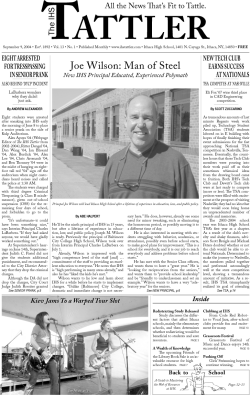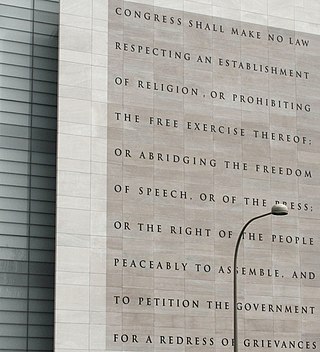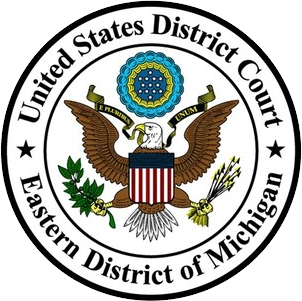
The Tattler is the student newspaper of Ithaca High School in Ithaca, New York. Founded in 1892, it is one of the oldest student newspapers in the United States. It is published twelve times a year and has a circulation of about 3,000, with distribution in both the school and in the community.
Tinker v. Des Moines Independent Community School District, 393 U.S. 503 (1969), was a landmark decision by the United States Supreme Court that defined First Amendment rights of students in U.S. public schools. The Tinker test, also known as the "substantial disruption" test, is still used by courts today to determine whether a school's interest to prevent disruption infringes upon students' First Amendment rights.

In the United States, freedom of speech and expression is strongly protected from government restrictions by the First Amendment to the U.S. Constitution, many state constitutions, and state and federal laws. Freedom of speech, also called free speech, means the free and public expression of opinions without censorship, interference and restraint by the government. The term "freedom of speech" embedded in the First Amendment encompasses the decision what to say as well as what not to say. The Supreme Court of the United States has recognized several categories of speech that are given lesser or no protection by the First Amendment and has recognized that governments may enact reasonable time, place, or manner restrictions on speech. The First Amendment's constitutional right of free speech, which is applicable to state and local governments under the incorporation doctrine, prevents only government restrictions on speech, not restrictions imposed by private individuals or businesses unless they are acting on behalf of the government. However, It can be restricted by time, place and manner in limited circumstances. Some laws may restrict the ability of private businesses and individuals from restricting the speech of others, such as employment laws that restrict employers' ability to prevent employees from disclosing their salary to coworkers or attempting to organize a labor union.
Prior restraint is censorship imposed, usually by a government or institution, on expression, that prohibits particular instances of expression. It is in contrast to censorship that establishes general subject matter restrictions and reviews a particular instance of expression only after the expression has taken place.

A student publication is a media outlet such as a newspaper, magazine, television show, or radio station produced by students at an educational institution. These publications typically cover local and school-related news, but they may also report on national or international news as well. Most student publications are either part of a curricular class or run as an extracurricular activity.

Dean v. Utica Community Schools, 345 F. Supp. 2d 799, is a landmark legal case in United States constitutional law, namely on how the First Amendment applies to censorship in a public school environment. The case expanded on the ruling definitions of the Supreme Court case Hazelwood School District v. Kuhlmeier, in which a high school journalism-oriented trial on censorship limited the First Amendment right to freedom of expression in curricular student newspapers. The case consisted of Utica High School Principal Richard Machesky ordering the deletion of an article in the Arrow, the high school's newspaper, a decision later deemed "unreasonable" and "unconstitutional" by District Judge Arthur Tarnow.
Freedom of the press in the United States is legally protected by the First Amendment to the United States Constitution.
In the United States, censorship involves the suppression of speech or public communication and raises issues of freedom of speech, which is protected by the First Amendment to the United States Constitution. Interpretation of this fundamental freedom has varied since its enshrinement. Traditionally, the First Amendment was regarded as applying only to the Federal government, leaving the states and local communities free to censor or not. As the applicability of states rights in lawmaking vis-a-vis citizens' national rights began to wane in the wake of the Civil War, censorship by any level of government eventually came under scrutiny, but not without resistance. For example, in recent decades, censorial restraints increased during the 1950s period of widespread anti-communist sentiment, as exemplified by the hearings of the House Committee on Un-American Activities. In Miller v. California (1973), the U.S. Supreme Court found that the First Amendment's freedom of speech does not apply to obscenity, which can, therefore, be censored. While certain forms of hate speech are legal so long as they do not turn to action or incite others to commit illegal acts, more severe forms have led to people or groups being denied marching permits or the Westboro Baptist Church being sued, although the initial adverse ruling against the latter was later overturned on appeal to the U.S. Supreme Court case Snyder v. Phelps.
Censorship in Israel is officially carried out by the Israeli Military Censor, a unit in the Israeli government officially tasked with carrying out preventive censorship regarding the publication of information that might affect the security of Israel. The body is headed by the Israeli Chief Censor, a military official appointed by Israel's Minister of Defense, who bestows upon the Chief Censor the authority to suppress information he deems compromising from being made public in the media, such as Israel's nuclear weapons program and Israel's military operations outside its borders. On average, 2240 press articles in Israel are censored by the Israeli Military Censor each year, approximately 240 of which in full, and around 2000 partially.

Desilets v. Clearview Regional Board of Education, 137 N.J. 585 (1994), was a New Jersey Supreme Court decision that held that public school curricular student newspapers that have not been established as forums for student expression are subject to a lower level of First Amendment protection than independent student expression or newspapers established as forums for student expression.

The Student Press Law Center (SPLC) is a non-profit organization that aims to promote, support and defend press freedom rights for student journalists at high schools and colleges in the United States. It is dedicated to student free-press rights and provides information, advice and legal assistance at no charge for students and educators.

In Guiles v. Marineau, 461 F.3d 320, cert. denied by 127 S.Ct. 3054 (2007), the U.S. Court of Appeals for the Second Circuit held that the First and Fourteenth Amendments to the Constitution of the United States protect the right of a student in the public schools to wear a shirt insulting the President of the United States and depicting images relating to drugs and alcohol.

California Education Code 48907 (1977), also known as the California Student Free Expression Law, acts as a counter to the Hazelwood v. Kuhlmeier (1988) Supreme Court ruling, which limited the freedom of speech granted to public high school newspapers. The Hazelwood v. Kuhlmeier decision held that public school curricular student newspapers that have not been established as "forums for student expression" are subject to a lower level of First Amendment protection than independent student expression or newspapers established as forums for student expression. Ed Code 48907 affirms the right of high school newspapers to publish whatever they choose, so long as the content isn't explicitly obscene, libelous, or slanderous, and doesn’t incite students to violate any laws or school regulations. The newspaper content must also pass the minimal disruption test set forth in the Supreme Court ruling on Tinker v. Des Moines (1969). In contrast with Hazelwood, which limited First Amendment protection to only those high school newspapers that had, through practice or policy, been established as forums for student expression, Ed Code 48907 affirms the right of all newspapers to the freedom of expression.
The issue of school speech or curricular speech as it relates to the First Amendment to the United States Constitution has been the center of controversy and litigation since the mid-20th century. The First Amendment's guarantee of freedom of speech applies to students in the public schools. In the landmark decision Tinker v. Des Moines Independent Community School District, the U.S. Supreme Court formally recognized that students do not "shed their constitutional rights to freedom of speech or expression at the schoolhouse gate".

Hosty v. Carter was a 2005 decision by the United States Court of Appeals for the Seventh Circuit that limited the free press rights of college newspapers.
Hazelwood School District et al. v. Kuhlmeier et al., 484 U.S. 260 (1988), was a landmark decision by the Supreme Court of the United States that held that public school curricular student newspapers that have not been established as forums for student expression are subject to a lower level of First Amendment protection than independent student expression or newspapers established as forums for student expression.

Frank D. LoMonte is an American lawyer and journalist known for his press freedom advocacy. He is the director of the Brechner Center for Freedom of Information, part of the University of Florida's College of Journalism and Communications, and was previously the executive director of the Student Press Law Center from 2008 to 2017.

The Classic is the student-run high school newspaper of Townsend Harris High School in Queens, New York. Frequently named the best high school newspaper in New York City by Baruch College's NYC public school journalism awards, the paper has run free of censorship and administrative review since its founding in the fall of 1984. In recent years, reporting by The Classic has been cited by publications like The New York Times, The Washington Post, The New York Post, The Wall Street Journal, and the Associated Press. Classic journalists have also been featured in various publications, including Teen Vogue, The Village Voice, and The New York Times. The paper publishes new content online on weeknights throughout the school year and publishes a print edition of collected pieces on a quarterly basis.

In June 2022, the Viking Saga, the student newspaper of Northwest High School in Grand Island, Nebraska, in the United States, published an issue that discussed Pride Month and other LGBTQ-related topics. In response, the school board and superintendent eliminated the school's journalism program and closed down the paper. The newspaper had been advised that transgender staff should not use their preferred names on bylines, and must use the names they had been given at birth.











